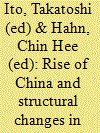| Srl | Item |
| 1 |
ID:
066816


|
|
|
|
|
| Publication |
Cambridge, MIT Press, 2005.
|
| Description |
xv, 425cm.
|
| Standard Number |
0262090406
|
|
|
|
|
|
|
|
|
|
|
|
Copies: C:1/I:0,R:0,Q:0
Circulation
| Accession# | Call# | Current Location | Status | Policy | Location |
| 050406 | 338.952009051/ITO 050406 | Main | On Shelf | General | |
|
|
|
|
| 2 |
ID:
098847


|
|
|
|
|
| Publication |
Cheltenham, Edward Elgar, 2010.
|
| Description |
vii, 345p.
|
| Standard Number |
9781848448551, hbk
|
|
|
|
|
|
|
|
|
|
|
|
Copies: C:1/I:0,R:0,Q:0
Circulation
| Accession# | Call# | Current Location | Status | Policy | Location |
| 055224 | 327.5105/ITO 055224 | Main | On Shelf | General | |
|
|
|
|
| 3 |
ID:
074183


|
|
|
|
|
| Publication |
2006.
|
| Summary/Abstract |
China faces rising current account surpluses and foreign reserves. Maintaining the fixed exchange rate runs the risk of overheating of the economy. It is desirable to pursue greater flexibility of the exchange rate regime in the short run, and gradual liberalization of capital account transactions in the medium run. Proper sequencing of various steps is recommended to prevent financial crises. Japan's transition from the dollar peg to a more flexible exchange rate system in 1971–1973 is considered to be a mistake, whereas the gradual capital account opening from the mid-1970s to mid-1990s is considered a success. The present study also analyzes Korea's mistake in opening its capital markets too far ahead of exchange rate flexibility, and liberalizing short-term capital rather than long-term capital. The challenge before China is similar to Japan's of 1969–1970, in the sense that the transition from the dollar peg is inevitable and desirable for the country, but decisive actions with proper sequencing are important.
|
|
|
|
|
|
|
|
|
|
|
|
|
|
|
|